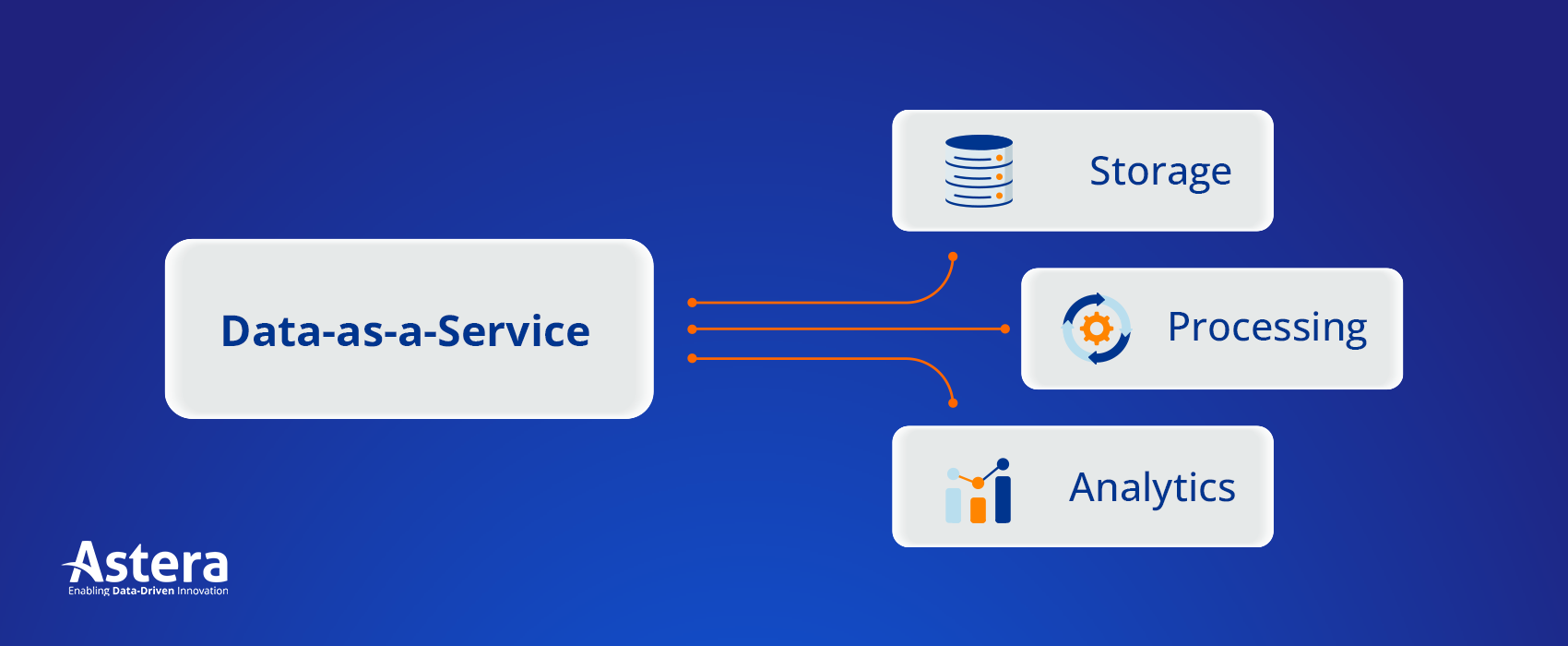Data has become an indispensable component of decision-making in all industries. Given the fluidity of the modern business environment and the tough competition, businesses need to make informed data-centric decisions on time. That’s where Data as a Service (DaaS) comes into play.
More and more businesses are adopting DaaS to manage data integration within business processes. Because of this, you can find DaaS solutions that offer a wide range of solutions ranging from simple storage to in-depth analytics into internal and external data sources.
What is DaaS?
Data-as-a-Service, or DaaS, is a service delivery strategy that involves delivering data storage, management, and analytics/insights over the internet.
In practical terms, DaaS products and services use cloud-based infrastructure to provide various solutions that help businesses better store, access, process, and integrate data from internal and third-party sources. If you’re familiar with Software-as-a-Service (SaaS) products, you can easily understand the role and impact of DaaS on business operations and decision-making.

Similar to SaaS, DaaS solutions are flexible in terms of features and how businesses can set up and adopt these solutions. For instance, an interior décor consultancy firm can start with data storage for storing designs and walkthroughs. And as a result, expand into data insights to understand what designs and ideas work for a particular clientele.
DaaS providers focus on facilitating users in managing data-related operations without worrying about infrastructure maintenance and delivery mechanisms.
As a result, businesses use DaaS products and services to efficiently use data for moving the needle forward by making decisions based on actionable insights and data trends.
Data Stewardship: The Core of DaaS Solutions
Now that you know what DaaS is, it’s important to understand the idea of data stewardship that DaaS providers use for structuring their services and improving the user experience for their users.
Essentially, data stewardship is all about managing the data lifecycle to ensure better data governance and compliance with internal and external regulatory frameworks. In simpler terms, data stewardship is all about creating, using, formatting, archiving, and storing a business’s data.
DaaS providers use this idea to ensure a business can get the maximum benefit from its data.
In some cases, the provider acts as the data steward for a business. However, at the enterprise level, businesses appoint internal data stewards that work with DaaS providers and internal stakeholders to ensure compliance and optimized use of data in various areas of the organization.
How DaaS Adds Value to Your Operations
DaaS solutions are helpful for businesses that have a lot of data but are uncertain about how to use it to get ahead of market conditions and competition.
To better understand this usefulness, here are the main benefits DaaS offers:
Data Centralization
Data storage solutions bring data that is scattered across an organization to central storage. Because of this, it simplifies and speeds up data access for the entire organization. Moreover, this centralized storage can be a single server or a cluster. This depends on the volume of data and how the organization wants to utilize it.
Better Integration with Popular Products and Services
DaaS products offer simplified and uniform data access points businesses can use to connect third-party applications and products. These access points are available as an API and on-platform options to automate application setup and integration.
Lowered Cost of Data Operations
Instead of maintaining in-house data storage solutions, businesses can save money and resources by outsourcing data management to DaaS providers. Consequently, this immediately removes the expenses for maintaining internal infrastructure and a team of experts. In addition, thanks to DaaS infrastructure’s minimal chances of failure, businesses get the most “bang” for their buck.
On-demand Expert Services
All popular Data-as-a-Service solutions are backed by experts who are always willing to answer all your questions. Therefore, these experts act as your extended in-house team from initial pre-sales consultation to managing crisis situations.
Minimal Security Issues
DaaS services are delivered through inherently secure cloud services. As a result, this security aspect extends to the businesses’ data operations and ensures that data remains protected at all times. In addition, DaaS providers implement security measures such as access control, TFA, and platform firewalls to harden data security.
Challenges in DaaS Adoption
As you saw, DaaS adds immense value to your business operations by streamlining how data is stored and used to gain useful insights. However, before you hurry up and integrate a DaaS provider, consider the following factors that might need you to plan more carefully.
Slow Transfers
Data transfer can become a bottleneck because of moving the data to cloud servers. This requires close attention to the bandwidth and internet connectivity. Therefore, you should consider building redundant network connectivity to avoid slow data transfers.
Data Privacy

You might have privacy and security concerns about storing sensitive data outside your organization. Consequently, this is a valid concern for businesses legally bound to protect customer information. As such, your DaaS provider can better advise you in implementing string data governance processes to ensure data safety at all times.
Infrastructure Security
Security of DaaS infrastructure is mainly the responsibility of the vendor. In most cases, the vendor already has a robust security policy that protects your data against cyber attacks. However, security is a two-way street. Business should also have internal data security policies to augment the vendor’s security processes.
Vendor Lock-in
There’s a slight chance that a business might face vendor lock-in when working with DaaS products. And this is mainly caused by high migration costs that deter businesses from upsetting the apple cart.
As a result, businesses must carefully structure their data hierarchy and related processes to migrate to a new vendor with minimum downtime easily.
DaaS: The Way Forward
We hope you have a clear idea of what DaaS is and the benefits it offers for your organization. Working with DaaS vendors helps you maintain and secure your data. Also, enables you to extract valuable insights from internal and external data sources.
Businesses of all sizes can benefit from working with DaaS products and making data-driven decisions that give them a sharper edge.
Astera Data Stack: A Comprehensive Solution
Astera Platform offers a single suite of apps that makes it easy to take advantage of cloud-based data solutions (in addition to on-premises infrastructure, when desired) to collect, govern, transform, and share trusted data. And because customers can pick and choose which specific Astera Platform tools they use — or adopt the entire platform at once — it provides maximum flexibility for building a cloud-based data solution tailored to your organization’s needs and preferences.
Try Astera Platform today to start using a reliable and secure cloud-based data solution that performs at the speed of your business.
Authors:
 Astera Analytics Team
Astera Analytics Team






